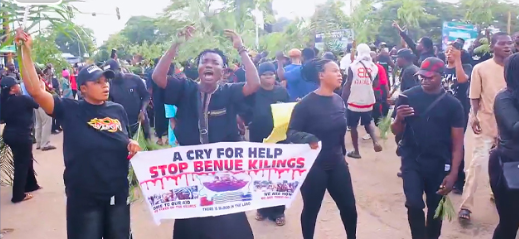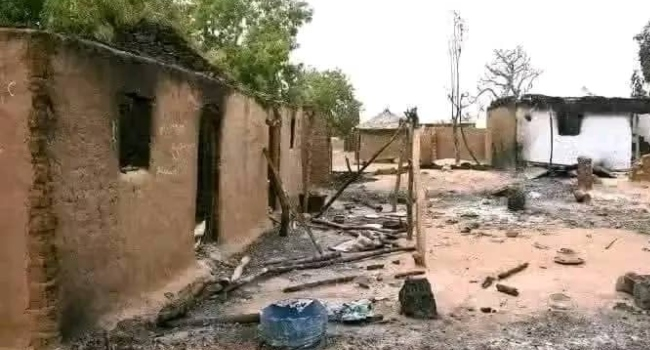This attack on the IDP camp in rural Benue State shows long-festering land and ethnic conflicts in the area.
Under a dawn sky in Yelewata village on June 14, smoke still curled from scorched mud huts and blackened thatch. Inside what had been a children’s dormitory, five bodies lay piled together among charred debris. The sole survivor was a 37-year-old farmer, Fidelis Adidi, who had been sleeping in a neighbouring room with his second wife and child. “My body is weak and my heart keeps racing,” he told journalists amid the ruins. “I lost five of my family members.”
Adidi had moved into a makeshift shelter at a local market, hoping it would protect his wife and six children from the rising violence between nomadic herders and farmers in Nigeria’s Middle Belt. That night, however, gunmen descended on the camp, setting homes ablaze and shooting sleeping families as they tried to flee.
Local officials described the situation as chaotic and in carnage. The Benue state governor, Hyacinth Alia, initially reported that 59 residents were killed in the assault, but aid agencies and villagers said the toll was far higher.
Amnesty International Nigeria, citing witnesses, warned that “many families were locked up and burnt inside their bedrooms,” and put the death toll at “at least 100”. Relief workers found dozens of charred bodies scattered in market stalls and storage huts. As one resident, Amineh Liapha Hir, lamented, “It is terribly bad, many people have died. It could be more than 100, and many houses were also burnt”.
A relative of one victim, Godwin Amatembe, described how attackers poured petrol on a one-room home and set it alight. His wounded nephew fled but was shot as he escaped; the mother and three children could not get out. “How could my sister and her innocent children, who were just struggling to survive, be wiped out in such a brutal way?” Amatembe asked.
The massacre in Yelewata, a community long burdened with displaced people, quickly ignited public anger. Within 24 hours, hundreds of youths in the state capital, Makurdi, marched through the streets, chanting “Stop Benue killings!” and demanding protection (one protest banner read exactly that).

Police eventually fired tear gas to disperse the crowd. In the face of mounting pressure, President Bola Tinubu flew to Benue on June 18 and labelled the events “very depressing,” vowing that “enough is enough”.
Opposition leaders and the Christian Association of Nigeria also condemned the bloodshed, lamenting that most victims were local farmers and displaced villagers.
Benue’s governor, Hyacinth Alia, later stood amid the devastated camp and confirmed at least 59 deaths. Still, eyewitnesses and aid groups insisted that the real toll will not be known until rescue workers finish their grim count.
Yelewata’s fate boldly shows a far broader crisis in Nigeria. Benue State, known as Nigeria’s “food basket,” has been engulfed for years in an ethno-religious land conflict. Largely Muslim Fulani herders, seeking grazing for their cattle, have clashed repeatedly with predominantly Christian farming communities over limited land and water. During the rainy season, cattle often stray into the farm plots, and by the dry season, competition over boreholes intensifies. Analysts note that climate change and population growth have pushed many herders in the state southward, further widening the frontiers of this centuries-old struggle.
According to Nigeria’s Nextier data project, more than 2,300 people were killed in herder-farmer violence nationwide between 2020 and 2024, and dozens more have died in Benue in related attacks over the past year. In late May alone, gunmen believed to be herders killed 42 people in four villages in Benue.
One federal lawmaker, Asema Achado, warned last year that “the relentless violence must end. Our farmers are the backbone of our economy, yet they live in constant fear.” Sadly, no change has been recorded as seen by the Yelewata incident. Despite these public outcries, systemic failures have enabled the bloodshed to continue. An anti-grazing law was passed in 2017, but has never been fully enforced.
Indeed, the National Emergency Management Agency NEMA and aid groups report that at least 6,527 people, many children, pregnant and nursing mothers, were driven from their homes across Benue in these recent attacks. Relief agencies are rushing food and medicine to overcrowded camps, while trauma counsellors soothe survivors. But farmlands are left untended, and entire communities are uprooted.

Human rights advocates say Nigeria’s leadership has fallen short. In a new Amnesty International report for May 2025, researchers found that nearly 6,900 people have been killed in Benue since mid-2023, far more than in any other state, and some 450,000 people have been displaced by armed raids.
Security forces in Benue are widely viewed as reactive rather than preventive. Officers often arrive after attackers have slipped away.
“Two years after promising to enhance security, things have only gotten worse,” Amnesty’s Nigeria director, Isa Sanusi, said, accusing the government of failing to protect lives.
Similarly, a researcher for Human Rights Watch, Anietie Ewang, said Yelewata should be a turning point: “This brutal attack is the latest reminder of how badly the government has failed to protect communities from violence and secure accountability,” he told the press.
Ewang and others urged a coordinated response, directed at stronger local policing and intelligence, as well as justice for victims. “Protection alone is not enough,” he cautioned. “There must also be justice for the victims of these attacks and accountability for the perpetrators of massacres.”
Benue’s grieving communities are not waiting for politics. The survivors of Yelewata cling to one another and the memory of those lost, pressing officials: How much longer must they endure this? . “I can die here if I want,” said Talatu Agauta, a pregnant mother who lost her rice farm in the raid, leaving a charred aftermath. “But if I die here, I don’t mind”. Her words show both defiance and despair. For now, they pray that Yelewata’s suffering will not have been in vain, that this “love for God, not hatred,” as one survivor urged, will finally end the cycle of bloodshed in Benue State.

